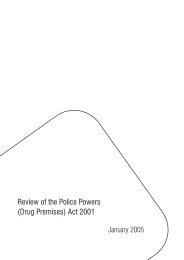Crimes (Forensic Procedures) Act 2000 - NSW Ombudsman - NSW ...
Crimes (Forensic Procedures) Act 2000 - NSW Ombudsman - NSW ...
Crimes (Forensic Procedures) Act 2000 - NSW Ombudsman - NSW ...
Create successful ePaper yourself
Turn your PDF publications into a flip-book with our unique Google optimized e-Paper software.
Without further information we are unable to determine whether these suspects were in fact given reasonable<br />
opportunity to attempt to communicate with a legal practitioner. However, it would appear that police could have given<br />
some suspects greater opportunity to obtain legal advice. They should at least provide phone access, and allow the<br />
suspect reasonable time to get through.<br />
6.2.3. Difficulties obtaining legal advice<br />
Many of the submissions we received explained that legal advice is not readily available for adult suspects and<br />
volunteers. The <strong>NSW</strong> Law Society stated:<br />
A very small percentage of people actually contact a lawyer to obtain legal advice as to whether they should or<br />
should not consent to the forensic procedure. Children have access to Legal Aid <strong>NSW</strong>’s Under 18s Hotline and<br />
can be advised by that service, but, other than through the Aboriginal and Torres Straight Islander Services, there<br />
is no corresponding provision for free legal advice for adult suspects and volunteers. 423<br />
Although free legal advice should be available for Aboriginal and Torres Strait Islander suspects and volunteers, this is<br />
not always the case. As the <strong>NSW</strong> Department of Aboriginal Affairs explained:<br />
There are practical limitations to all Aboriginal suspects obtaining legal advice while in police custody due to<br />
Aboriginal legal services not being sufficiently staffed to attend all matters. 424<br />
The Intellectual Disability Rights Service commented:<br />
This right [to seek legal advice] is greatly weakened by the fact that there are very few avenues for free legal<br />
advice. Very few offenders can afford to pay a private solicitor to advise them about whether or not they must<br />
submit to DNA sampling. 425<br />
The Service further commented that it is particularly difficult for people with intellectual disabilities to access legal<br />
advice:<br />
People with an intellectual disability have even greater barriers to accessing legal advice as they may not<br />
appreciate the need for the advice or they may not know where to find legal advice. 426<br />
It is not clear from the information available exactly what impact obtaining legal advice has on whether a person<br />
consents or not. However, we did find some evidence to suggest that suspects may be less likely to consent to a<br />
forensic procedure after obtaining legal advice on the issue. 427<br />
6.2.4. Relationship with Part 9 of the Law Enforcement (Powers and<br />
Responsibilities) <strong>Act</strong><br />
Part 9 of the Law Enforcement (Powers and Responsibilities) <strong>Act</strong> 2002 (formerly Part 10A of the <strong>Crimes</strong> <strong>Act</strong> 1900) sets<br />
out the rights of people detained in police custody after arrest. Before conducting any investigative procedure, such<br />
as questioning or searching a suspect, police must tell the suspect that he or she may attempt to communicate with<br />
a legal practitioner, and must provide reasonable facilities for this. Police must suspend the investigative procedure<br />
while the person attempts to obtain legal advice, and must wait if the person has asked a legal practitioner to attend<br />
the police station. 428<br />
Some of the police officers we interviewed advised that suspects often seek legal advice when they are first taken<br />
into custody. At this stage, they may not be aware that police intend to ask them to consent to a forensic procedure.<br />
By the time police do ask for consent, the suspect may have been in custody for some time, and may be reluctant to<br />
go back and seek further legal advice about the matter. This may be one reason why only a very small proportion of<br />
suspects obtain legal advice about forensic procedures. 429<br />
Police are required to give suspects a summary of their rights under Part 9 of the Law Enforcement (Powers and<br />
Responsibilities) <strong>Act</strong>. 430 Suspects could then seek legal advice on this issue when they are first taken into custody.<br />
Advising suspects when they are taken into custody that police may wish to conduct a forensic procedure would<br />
not replace suspects being given reasonable opportunity to seek legal advice about proposed forensic procedures.<br />
Police would still have to ask, when completing the consent form, whether the suspect has had reasonable<br />
opportunity to communicate with a legal practitioner. If the suspect indicates they have not, police must then provide<br />
this opportunity. 431<br />
<strong>NSW</strong> <strong>Ombudsman</strong><br />
DNA sampling and other forensic procedures conducted on suspects and volunteers under the <strong>Crimes</strong> (<strong>Forensic</strong> <strong>Procedures</strong>) <strong>Act</strong> <strong>2000</strong> 79

















